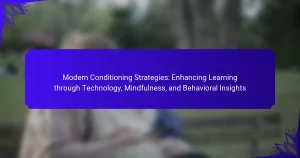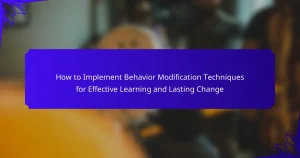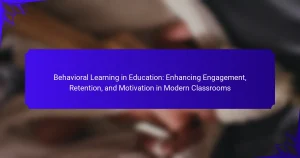Nurturing critical skills in modern learning is essential for effective problem-solving and creativity. Education provides structured knowledge acquisition, while independent thinking encourages personal analysis and exploration. This article examines the roles of education and independent thinking, highlights their unique attributes, and discusses effective strategies for fostering critical skills in learners. Understanding this distinction can enhance the educational experience and prepare students for complex challenges.
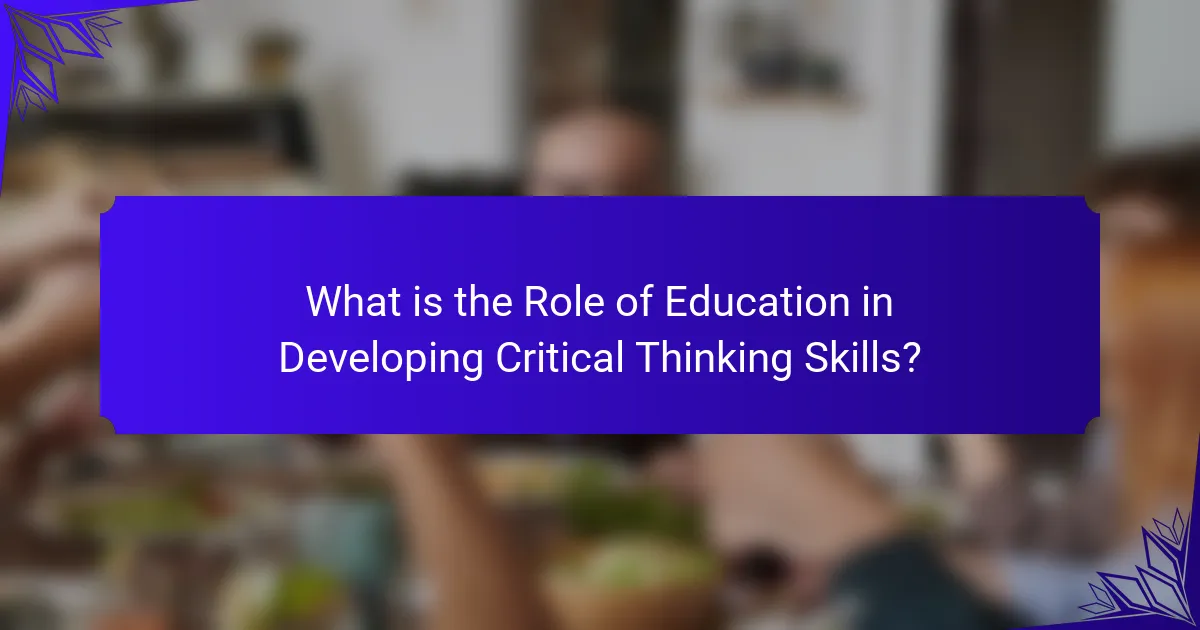
What is the Role of Education in Developing Critical Thinking Skills?
Education plays a crucial role in developing critical thinking skills by fostering analytical abilities and encouraging independent thought. Through structured learning environments, students engage with diverse perspectives, enhancing their capacity to evaluate information critically.
Active learning methods, such as problem-solving and collaborative projects, promote deeper understanding and application of concepts. These approaches empower learners to question assumptions and develop reasoned arguments.
Moreover, educators serve as facilitators, guiding students in recognizing biases and evaluating evidence. This mentorship is essential in nurturing a mindset geared towards critical inquiry, which is vital in modern learning contexts.
In summary, education not only imparts knowledge but also cultivates the critical thinking skills necessary for navigating complex challenges in today’s world.
How does traditional education foster independent thought?
Traditional education fosters independent thought by encouraging critical analysis, promoting diverse perspectives, and cultivating problem-solving skills. Students learn to evaluate information critically, which enhances their ability to think independently. Interaction with peers and educators further stimulates intellectual discourse, leading to a deeper understanding of various subjects. This environment nurtures self-directed learning, where students take initiative in their educational journeys, ultimately fostering a mindset geared towards independent thought.
What are the limitations of conventional educational methods?
Conventional educational methods often limit independent thinking by emphasizing rote memorization over critical analysis. These methods typically prioritize standardized testing, which can stifle creativity and discourage questioning. Additionally, they often focus on a one-size-fits-all approach, neglecting individual learning styles and needs. This can result in disengagement and a lack of motivation among students. Ultimately, the limitations of conventional education hinder the development of essential critical thinking skills necessary for modern learning.
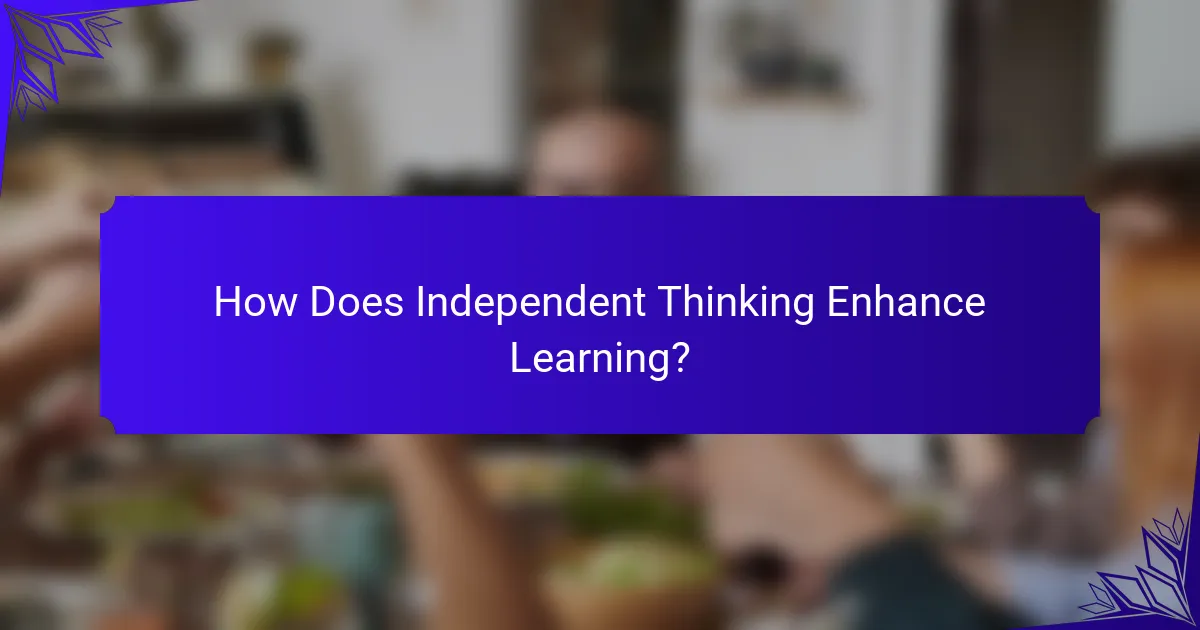
How Does Independent Thinking Enhance Learning?
Independent thinking significantly enhances learning by fostering critical skills essential for problem-solving and creativity. It encourages learners to analyze information, question assumptions, and explore diverse perspectives. This approach nurtures a deeper understanding of subjects, promoting retention and application of knowledge. Independent thinkers demonstrate higher adaptability in learning environments, as they engage actively rather than passively absorbing information. As a result, they develop unique attributes like innovative thinking and self-directed learning, which are crucial in modern education.
What are the key characteristics of independent thinkers?
Independent thinkers exhibit curiosity, open-mindedness, and the ability to analyze information critically. They prioritize questioning assumptions and seeking diverse perspectives. These traits foster innovation and adaptability in problem-solving. Additionally, independent thinkers demonstrate resilience in the face of challenges, allowing them to persist in their pursuits.
How does independent thinking contribute to problem-solving?
Independent thinking enhances problem-solving by fostering creativity and innovation. It encourages individuals to analyze situations from multiple perspectives, leading to unique solutions. This ability to think critically is essential in modern learning environments, where traditional education may not always promote independent thought. By nurturing this skill, learners become adept at tackling complex challenges effectively.

What Universal Attributes Distinguish Education from Independent Thinking?
Education emphasizes structured knowledge acquisition, while independent thinking fosters personal analysis and creativity. Education often relies on established curricula, whereas independent thinking encourages questioning and exploration. Key attributes distinguishing them include the source of knowledge, the role of critical analysis, and the application of learned concepts. Education generally provides foundational skills, while independent thinking cultivates innovative problem-solving abilities. This duality is essential for developing critical skills in modern learning environments.
How do structured curricula influence learning outcomes?
Structured curricula significantly enhance learning outcomes by providing clear frameworks that guide students. They promote engagement and critical thinking through organized content and assessments. This approach fosters an environment that encourages independent thinking while ensuring foundational knowledge.
Structured curricula often incorporate diverse teaching methods, which cater to various learning styles. For example, project-based learning within a structured framework allows students to apply concepts in real-world contexts, enhancing retention and understanding. As a result, students develop critical skills necessary for modern challenges.
Moreover, structured curricula facilitate measurable progress through defined learning objectives and assessments. This clarity helps educators identify areas for improvement, ensuring that students are not only absorbing information but also developing analytical skills. Ultimately, structured curricula bridge the gap between education and independent thinking, nurturing well-rounded learners.
What role does assessment play in education versus independent thinking?
Assessment plays a crucial role in education by measuring knowledge and skills, while independent thinking fosters creativity and problem-solving. Effective assessment can guide learners to think critically, but it may also constrain their ability to explore ideas freely. Balancing structured evaluation with opportunities for independent thought enhances overall learning outcomes. Emphasizing both aspects cultivates a comprehensive educational experience that nurtures critical skills essential for modern society.

What Unique Attributes Define Effective Independent Thinking?
Effective independent thinking is defined by attributes such as creativity, analytical skills, and self-direction. These unique attributes foster problem-solving and enable individuals to generate original ideas. Creativity encourages innovative solutions, while analytical skills enhance decision-making. Self-direction promotes personal responsibility in learning, allowing for a deeper understanding of concepts.
How does creativity manifest in independent thinkers?
Creativity in independent thinkers manifests through unique problem-solving, innovative ideas, and unconventional approaches. These thinkers leverage their experiences and perspectives, leading to original solutions that challenge norms. Independent thought nurtures creativity by encouraging exploration and experimentation, fostering an environment where diverse ideas thrive. This process enhances critical skills essential for adapting in modern learning contexts.
What impact does self-directed learning have on personal growth?
Self-directed learning significantly enhances personal growth by fostering independence, critical thinking, and adaptability. It encourages individuals to take charge of their educational journey, leading to deeper engagement and motivation. This approach cultivates unique attributes such as self-discipline and resilience, essential for navigating modern challenges. As a result, learners develop skills that are crucial for personal and professional success.
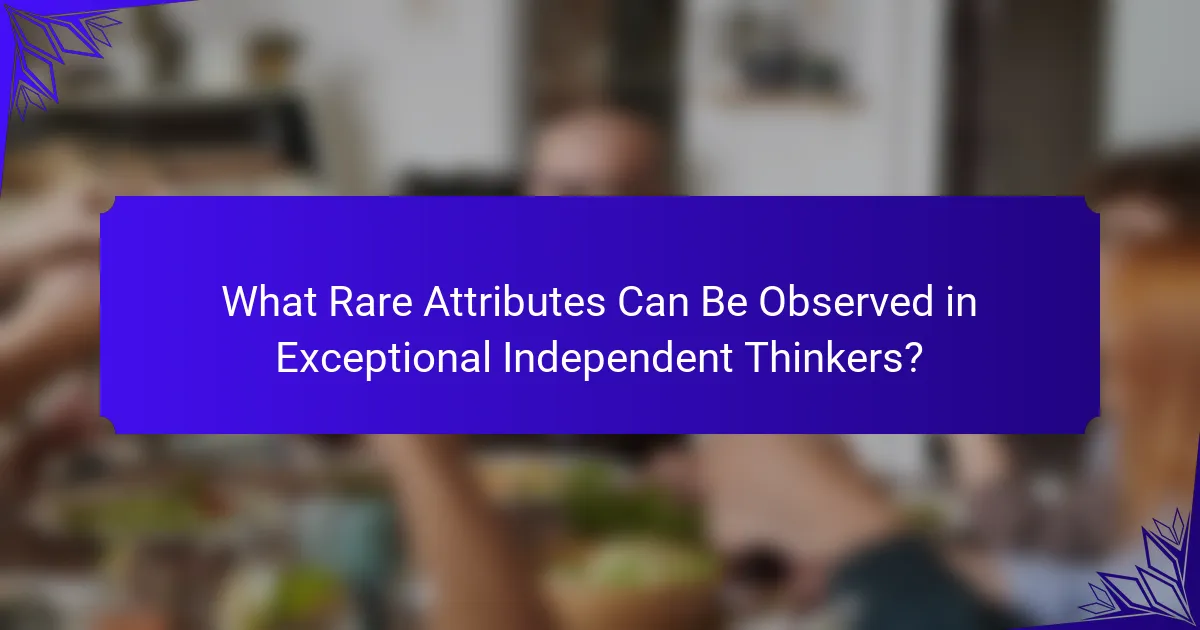
What Rare Attributes Can Be Observed in Exceptional Independent Thinkers?
Exceptional independent thinkers exhibit rare attributes such as unconventional problem-solving, heightened emotional intelligence, and a strong sense of self-efficacy. These traits enable them to navigate complex challenges creatively and effectively. They often demonstrate a unique ability to synthesize disparate ideas, leading to innovative solutions. This synthesis is rooted in their willingness to question norms and explore alternative perspectives, fostering a rich environment for critical thinking and personal growth.
How do cultural influences shape independent thinking?
Cultural influences significantly shape independent thinking by providing diverse perspectives and value systems. These influences encourage critical analysis and personal interpretation, fostering creativity and innovation. For instance, exposure to various cultural narratives enhances problem-solving skills and adaptability. Additionally, cultural contexts can either promote or hinder questioning norms, impacting the development of independent thought.
What are uncommon methods for nurturing independent thought?
Encouraging independent thought can be achieved through various uncommon methods. Engaging in philosophical debates allows individuals to explore diverse perspectives. Incorporating art-based learning fosters creativity and critical analysis. Practicing mindfulness techniques enhances self-awareness and reflection. Utilizing project-based learning encourages problem-solving and innovation. Finally, exposing learners to real-world challenges promotes practical application of independent thinking skills.
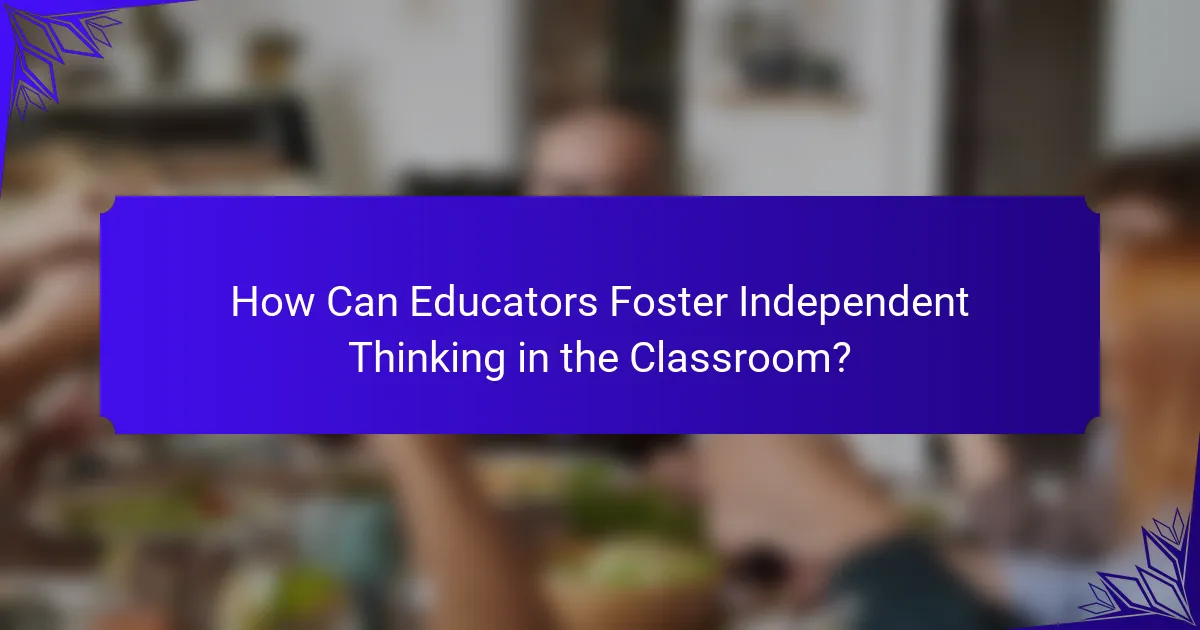
How Can Educators Foster Independent Thinking in the Classroom?
Educators can foster independent thinking by encouraging problem-solving, promoting inquiry-based learning, and allowing student autonomy. These strategies cultivate critical skills necessary for modern learning environments.
One effective approach is to integrate project-based learning, which enables students to explore real-world problems. This method nurtures creativity and analytical skills, essential for independent thought.
Additionally, incorporating open-ended questions in discussions stimulates critical thinking. When students engage in dialogue about complex issues, they learn to articulate their ideas and challenge assumptions.
Lastly, providing opportunities for self-directed learning empowers students to take ownership of their education. This autonomy fosters confidence and promotes lifelong learning habits, ultimately enhancing independent thinking skills.
What teaching strategies promote critical skills?
Teaching strategies that promote critical skills include inquiry-based learning, collaborative projects, and problem-solving tasks. These methods encourage students to analyze, evaluate, and create, fostering independent thinking. Inquiry-based learning enhances curiosity, as students formulate questions and seek answers. Collaborative projects develop communication and teamwork skills, essential for critical thinking. Problem-solving tasks challenge students to apply knowledge in real-world scenarios, promoting deeper understanding. Implementing these strategies cultivates a classroom environment that nurtures critical skills, preparing students for complex challenges.
How can project-based learning enhance independent thinking?
Project-based learning enhances independent thinking by fostering problem-solving skills and encouraging self-directed learning. This approach empowers students to take ownership of their education, promoting critical analysis and creativity. As students engage in real-world projects, they develop the ability to think critically and make decisions independently. Research shows that project-based learning leads to deeper understanding and retention of knowledge, making it a unique attribute of modern education. Furthermore, it cultivates collaboration and communication skills, essential for success in today’s world.
What role does technology play in modern learning environments?
Technology enhances modern learning by facilitating personalized education, fostering collaboration, and promoting critical thinking. Digital tools enable learners to access diverse resources, engage in interactive experiences, and develop independent thinking skills. For instance, online platforms provide real-time feedback, allowing students to refine their understanding and approach problem-solving effectively. Additionally, technology supports the integration of multimedia content, which can deepen comprehension and retention of complex concepts. Overall, technology plays a crucial role in nurturing critical skills essential for success in today’s dynamic environment.
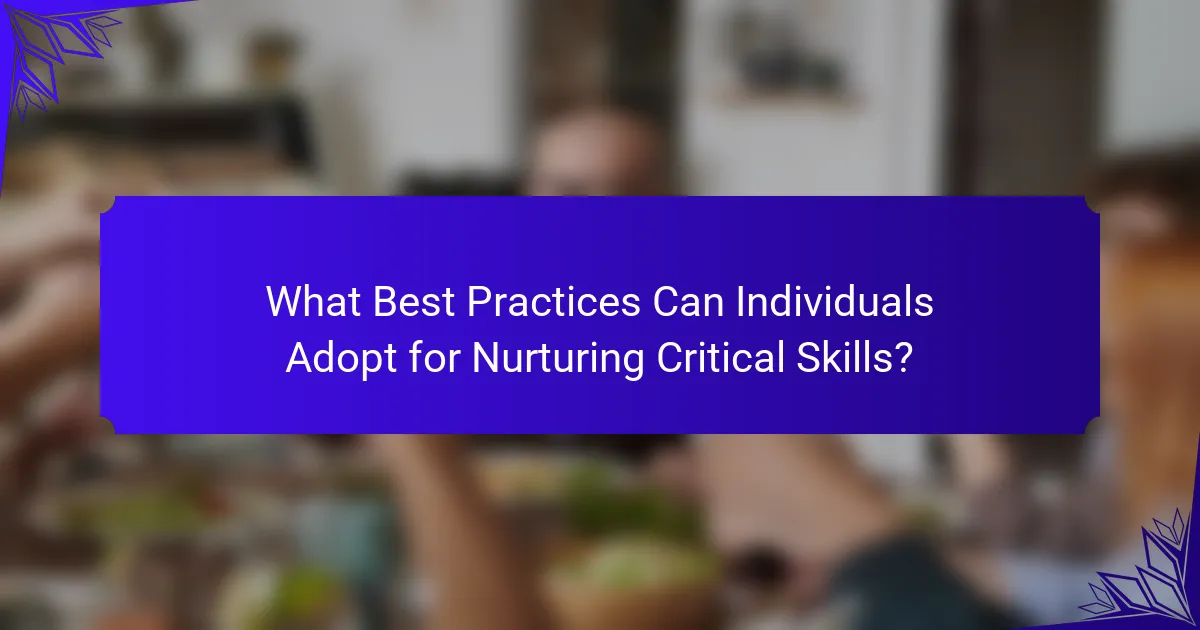
What Best Practices Can Individuals Adopt for Nurturing Critical Skills?
Individuals can adopt several best practices to nurture critical skills effectively. Engaging in reflective thinking enhances the ability to analyze and evaluate information. Collaborative learning experiences, such as group discussions, foster diverse perspectives and improve problem-solving skills. Regularly challenging assumptions through questioning stimulates independent thinking and creativity. Additionally, setting specific goals for skill development provides a clear focus and motivation. Embracing a growth mindset encourages resilience and adaptability in learning processes.
What common mistakes should be avoided in the pursuit of independent thinking?
To foster independent thinking, avoid common mistakes that hinder critical skills. One mistake is relying too heavily on authority figures for answers, which stifles personal inquiry. Another is conforming to groupthink, leading to a lack of diverse perspectives. Failing to question assumptions can also limit creative problem-solving. Lastly, neglecting self-reflection prevents the development of personal insights and understanding.
How can one effectively balance education and independent thought?
Balancing education and independent thought requires integrating critical thinking into learning. Education often emphasizes structured knowledge, while independent thought encourages personal analysis and creativity.
To effectively balance these, one can adopt the following strategies:
1. Encourage questioning: Promote an environment where students feel comfortable asking questions and challenging ideas.
2. Integrate real-world problems: Use case studies or current events to stimulate critical thinking and application of knowledge.
3. Foster discussions: Create opportunities for group discussions that allow diverse perspectives and independent thinking.
4. Provide autonomy: Allow students to choose projects or topics that interest them, enhancing engagement and independent thought.
By applying these strategies, learners can develop critical skills that bridge education and independent thinking.
